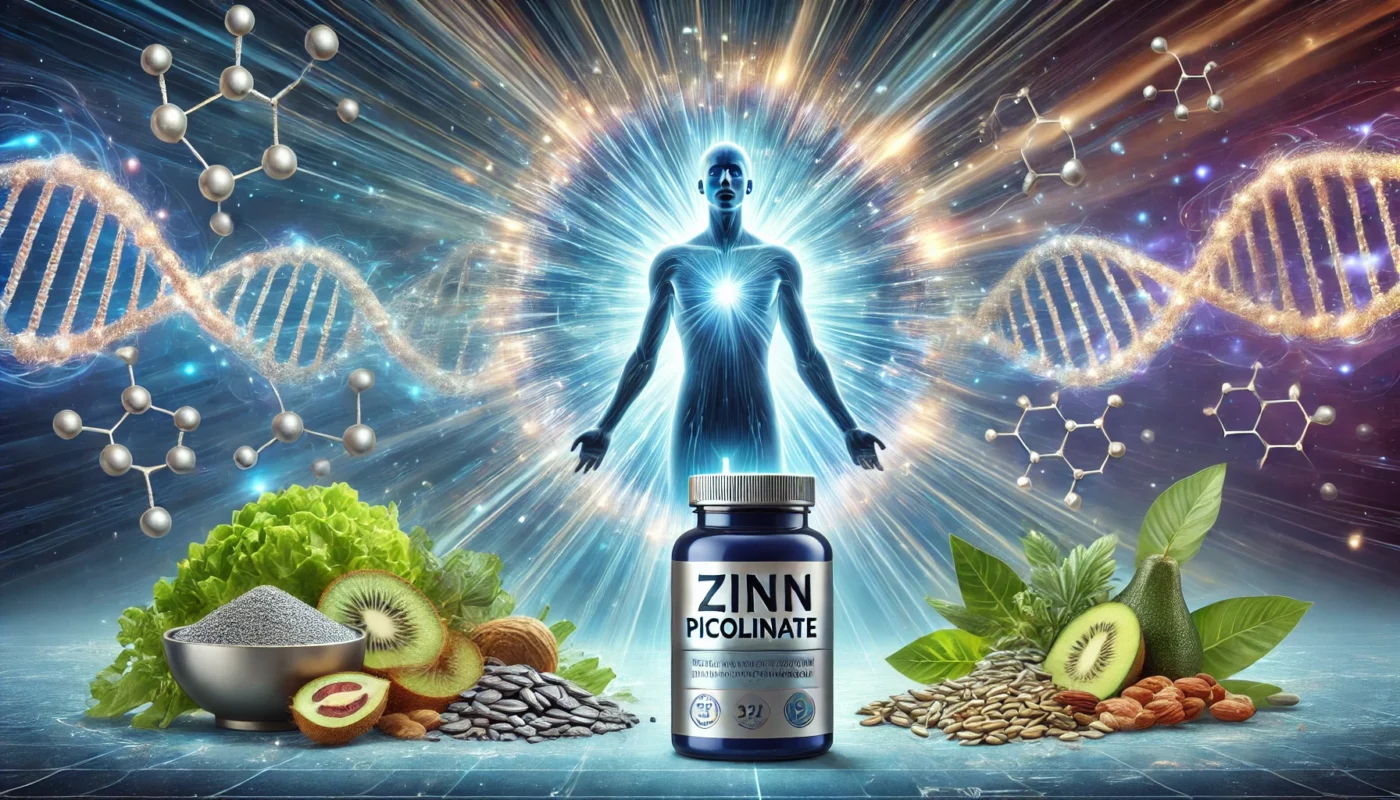Chronic fatigue is a debilitating condition affecting millions worldwide, characterized by persistent tiredness that isn’t relieved by rest. It’s a complex issue with numerous potential causes, including nutritional deficiencies, hormonal imbalances, and chronic stress. Among the nutrients essential for maintaining energy and combating fatigue, zinc stands out due to its pivotal role in cellular metabolism, immune function, and hormone regulation. Zinc picolinate, a highly bioavailable form of zinc, has emerged as a powerful tool for restoring energy levels and supporting overall well-being.
This article explores the science behind zinc picolinate’s role in combating fatigue, its mechanisms of action, and the clinical evidence supporting its use for restoring energy.
You May Also Like:
Zinc Picolinate for Growing Teens: Hormonal and Immune Benefits
Zinc Picolinate and Rheumatoid Arthritis: What We Know So Far
Zinc Picolinate and Chronic Fatigue: Can It Help Restore Energy? is an original (HSLHealing) article.
What Is Chronic Fatigue?
Chronic fatigue can range from occasional tiredness to debilitating exhaustion that interferes with daily life. It can be caused by:
- Nutritional Deficiencies: Inadequate intake of essential vitamins and minerals.
- Hormonal Imbalances: Dysregulated cortisol, thyroid, or sex hormones.
- Oxidative Stress: Damage caused by free radicals, which impairs cellular function.
- Chronic Illness: Conditions such as chronic fatigue syndrome (CFS), fibromyalgia, or autoimmune disorders.
While chronic fatigue is often multifactorial, addressing nutritional imbalances—particularly zinc deficiency—can significantly improve energy levels.

Why Zinc Is Essential for Energy
Zinc is a trace mineral involved in over 300 enzymatic reactions in the body, many of which are critical for energy production and combating fatigue:
- Cellular Metabolism:
Zinc supports the activity of enzymes involved in the Krebs cycle, a series of reactions that generate ATP, the body’s primary energy currency. - Hormone Regulation:
Zinc influences the production of thyroid hormones, cortisol, and insulin, all of which play vital roles in maintaining energy balance. - Immune Support:
Chronic infections or inflammation can drain energy reserves. Zinc boosts immune function, reducing the burden of chronic fatigue linked to immune dysregulation. - Antioxidant Defense:
Zinc acts as a co-factor for superoxide dismutase (SOD), an enzyme that neutralizes free radicals, protecting cells from oxidative stress.
What Is Zinc Picolinate?
Zinc picolinate is a chelated form of zinc, in which zinc is bound to picolinic acid. This form enhances zinc absorption in the gastrointestinal tract, making it one of the most bioavailable and effective zinc supplements available. For individuals experiencing fatigue, ensuring efficient zinc delivery to tissues is critical for restoring energy.
The Link Between Zinc Deficiency and Fatigue
Zinc deficiency is a widespread issue, with the World Health Organization (WHO) estimating that up to 17% of the global population may be at risk. Key factors contributing to zinc deficiency include:
- Poor Diet: Insufficient intake of zinc-rich foods.
- Increased Losses: Stress, illness, and certain medications can increase zinc excretion.
- Malabsorption: Conditions like Crohn’s disease, celiac disease, or irritable bowel syndrome (IBS) impair zinc absorption.
Consequences of Zinc Deficiency on Energy Levels:
- Impaired cellular metabolism, reducing ATP production.
- Hormonal imbalances, particularly in the thyroid and adrenal glands.
- Increased oxidative stress, which damages energy-producing mitochondria.
Promote Vitality and Fight Fatigue Naturally with Zinc Picolinate Supplements—Shop Today on Amazon!

How Zinc Picolinate Supports Energy and Reduces Fatigue
Zinc picolinate addresses the underlying mechanisms contributing to fatigue and low energy:
1. Boosting Cellular Energy Production
Zinc is a co-factor for enzymes in the Krebs cycle, facilitating the conversion of nutrients into ATP. By supporting mitochondrial function, zinc ensures that cells have adequate energy to perform essential functions.
- Clinical Evidence: A study in Metabolism found that zinc supplementation improved ATP production in individuals with chronic fatigue syndrome, leading to measurable increases in energy levels.
2. Regulating Hormonal Balance
Zinc plays a vital role in thyroid hormone production, which governs metabolism and energy balance. It also supports adrenal function, reducing fatigue linked to chronic stress and dysregulated cortisol levels.
- Research Insight: A study in Journal of Trace Elements in Medicine and Biology reported that zinc supplementation improved thyroid hormone levels in individuals with hypothyroidism, alleviating symptoms of fatigue.
3. Reducing Inflammation and Oxidative Stress
Chronic fatigue is often associated with systemic inflammation and oxidative damage. Zinc’s anti-inflammatory and antioxidant properties protect mitochondria, preserving their ability to generate energy.
- Study Finding: Research in Free Radical Biology and Medicine demonstrated that zinc supplementation reduced markers of oxidative stress in individuals with chronic fatigue, improving mitochondrial efficiency.
4. Enhancing Immune Function
Fatigue can be exacerbated by chronic infections or immune dysregulation. Zinc strengthens the immune system, reducing the energy drain caused by prolonged illness.
- Clinical Insight: A randomized controlled trial in Nutrients showed that zinc supplementation improved immune markers and reduced fatigue in participants recovering from chronic viral infections.

Clinical Studies on Zinc and Fatigue
- Zinc and Chronic Fatigue Syndrome (CFS) (2014):
A study in Biological Trace Element Research investigated the effects of zinc supplementation in individuals with CFS. Participants receiving 25 mg of zinc daily reported significant improvements in energy levels and reduced fatigue after eight weeks. - Zinc and Thyroid Function (2017):
Research published in Endocrine Research evaluated the impact of zinc on thyroid health in fatigued individuals. Results showed that zinc supplementation restored normal thyroid hormone levels, alleviating fatigue and improving metabolic function. - Zinc and Mitochondrial Function (2019):
A study in Journal of Clinical Biochemistry and Nutrition examined zinc’s role in mitochondrial health. Supplementation improved mitochondrial enzyme activity, increasing ATP production and reducing fatigue symptoms in participants.
Dietary Sources of Zinc
While zinc picolinate supplementation is effective, incorporating zinc-rich foods into the diet is also beneficial. Foods high in zinc include:
- Animal-Based Sources: Oysters (highest natural source), beef, poultry, and eggs.
- Plant-Based Sources: Legumes (e.g., lentils, chickpeas), seeds (e.g., pumpkin seeds, sunflower seeds), and nuts (e.g., cashews, almonds).
Individuals with restricted diets or absorption issues may benefit more from zinc picolinate supplementation.
Promote Endurance and Revitalize Your Energy with Zinc Picolinate—Shop Amazon’s Best Now!

Recommended Dosage and Safety
The recommended dietary allowance (RDA) for zinc is:
- Adult men: 11 mg/day
- Adult women: 8 mg/day
For managing fatigue, therapeutic doses of zinc picolinate typically range from 20–40 mg/day. However, excessive zinc intake (above 40 mg/day) can cause:
- Nausea and gastrointestinal discomfort
- Reduced copper absorption, leading to deficiencies
Consult a healthcare provider before starting supplementation to determine the appropriate dosage.
Combining Zinc Picolinate with Other Nutrients for Energy
Zinc picolinate works synergistically with other nutrients to combat fatigue and support energy production:
- Magnesium:
Magnesium supports ATP production and complements zinc’s role in energy metabolism. - Vitamin D:
Vitamin D regulates calcium and phosphate balance, enhancing mitochondrial efficiency and reducing fatigue. - Iron:
Iron is essential for oxygen transport, and zinc supports hemoglobin synthesis. Together, they optimize cellular energy. - B Vitamins:
B-complex vitamins are co-factors in energy metabolism, amplifying zinc’s effects.
Support Energy Metabolism and Overcome Fatigue with Zinc Picolinate Capsules—Order Today on Amazon!

Future Research Directions
While existing studies highlight zinc’s role in combating fatigue, further research is needed to explore:
- Long-term effects of zinc picolinate supplementation on chronic fatigue syndromes.
- Synergistic interactions between zinc and other micronutrients.
- The impact of zinc on fatigue in diverse populations, including athletes and individuals with chronic illnesses.
Conclusion: Zinc Picolinate as an Energy Booster
Zinc picolinate offers a science-backed solution for addressing fatigue and restoring energy. By enhancing cellular metabolism, regulating hormones, reducing oxidative stress, and supporting immune function, zinc picolinate tackles the root causes of chronic fatigue.
For individuals struggling with persistent tiredness, incorporating zinc picolinate into a comprehensive nutrition plan can provide significant benefits. As always, consult a healthcare provider to tailor supplementation to your specific needs and ensure safe and effective use.

References
- The effect of zinc supplementation on fatigue among elderly community dwellers: A parallel clinical trial. Retrieved from: https://pmc.ncbi.nlm.nih.gov/articles/PMC8133867/
- Critical Role of Zinc as Either an Antioxidant or a Prooxidant in Cellular Systems. Retrieved from: https://pmc.ncbi.nlm.nih.gov/articles/PMC5884210/
- Zinc at the crossroads of exercise and proteostasis. Retrieved from: https://pmc.ncbi.nlm.nih.gov/articles/PMC7284914/
- Effects of magnesium picolinate, zinc picolinate, and selenomethionine co-supplementation on reproductive hormones, and glucose and lipid metabolism-related protein expressions in male rats fed a high-fat diet. Retrieved from: https://pmc.ncbi.nlm.nih.gov/articles/PMC8991512/
- Zinc Essentiality, Toxicity, and Its Bacterial Bioremediation: A Comprehensive Insight. Retrieved from: https://pmc.ncbi.nlm.nih.gov/articles/PMC9197589/
Important Note: The information contained in this article is for general informational purposes only, and should not be construed as health or medical advice, nor is it intended to diagnose, prevent, treat, or cure any disease or health condition. Before embarking on any diet, fitness regimen, or program of nutritional supplementation, it is advisable to consult your healthcare professional in order to determine its safety and probable efficacy in terms of your individual state of health.
Regarding Nutritional Supplements Or Other Non-Prescription Health Products: If any nutritional supplements or other non-prescription health products are mentioned in the foregoing article, any claims or statements made about them have not been evaluated by the U.S. Food and Drug Administration, and such nutritional supplements or other health products are not intended to diagnose, treat, cure, or prevent any disease.

